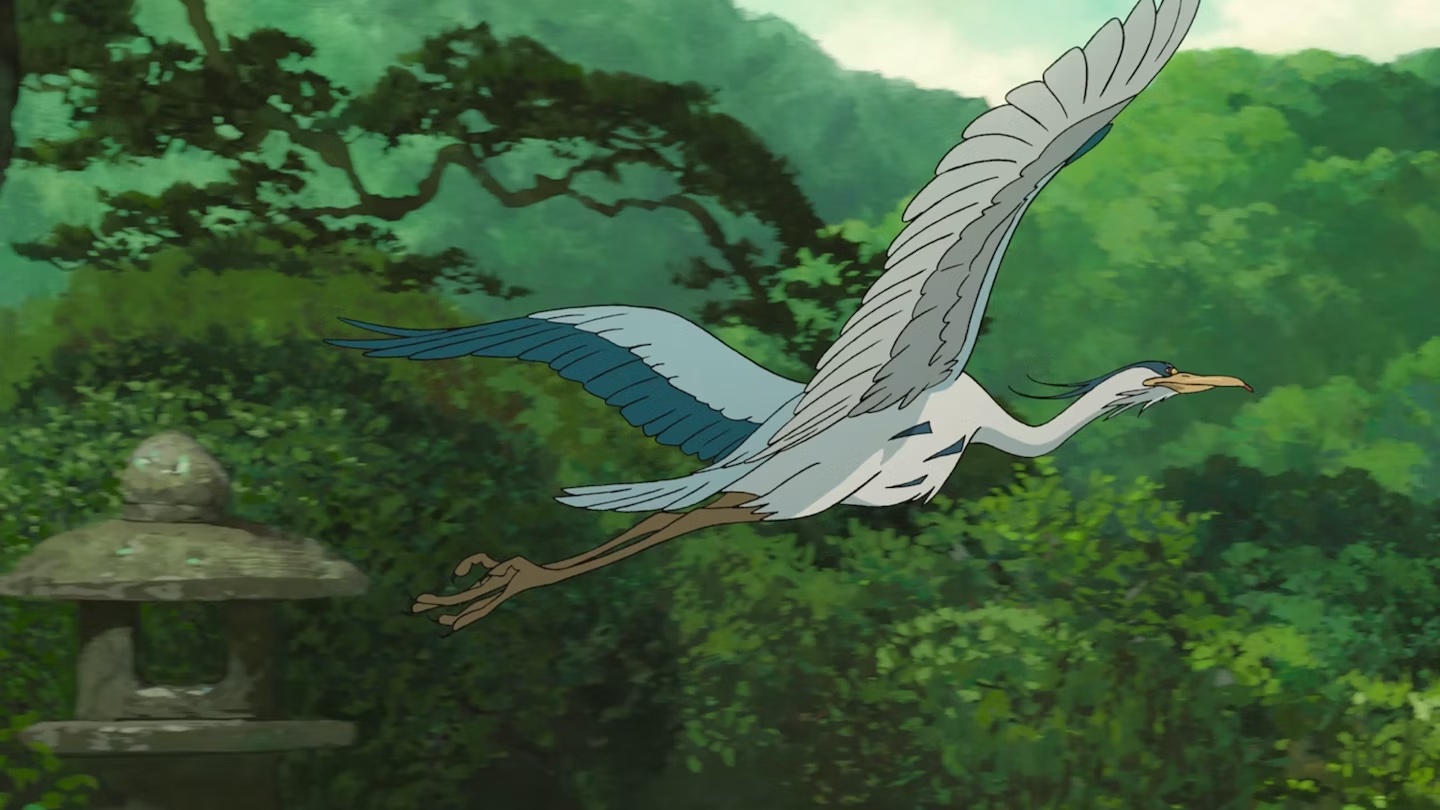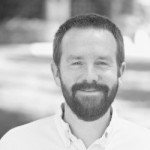
The simple thing to say about Hayao Miyazaki’s new film, The Boy and the Heron, is that it is a film about grief – grief over loved ones lost to death; grief over relationships lost to ambition, as in the loss a son feels when his father devotes himself foremost to his work, and, perhaps, the loss a father feels when he realizes, too late, that he has missed his son’s childhood; grief over a life spent doing something that almost no one seems to want to carry on, and the few who do are not the ones you would have chosen, and grief over your own unwillingness to let go of minding your legacy; grief over what you’ve missed by holding on too tightly to the past; grief over a nation that has not learned from its mistakes; grief over a world that seems about to end, and there seems to be nothing you can do about it. And to be sure, all that grief is part of The Boy and the Heron.
It is an old man’s film, thick with… not regrets but grievances, guided by questions, punctuated with answers that feel more like observations unrelated to the questions but somehow conciliatory nonetheless: “I did not divine the answer to this, but I did discover that, and for some reason it makes it okay.” It is an old man’s film in that it falls back on images and motifs the old man has found, over his long work-life, still speak to him, even if he cannot translate their language any other way but this. There is a persistent negative criticism of aging auteurs that they rely too much on old tricks and well-worn conceits. Maybe it’s just that these are the things that have persistently spoken to them, so of course they return to them, and them only, as they near the end of their lives. Likely, they are not the guides they would have chosen, but they are the guides given them. We do not choose our mentors or our spirit guides or even our companions on our journey. This too is an old man’s observation.
Those are the simple things to say about The Boy and the Heron, and they are not that simple. The more difficult thing to say is this:
One morning in October a half decade ago, I woke on a sandbar along the Colorado River in the canyons below Hoover Dam. I had slept there, exposed but for my sleeping bag, with my kayak pulled up behind me in the grass lest the dam release water in the night and carry my kayak away. I didn’t care if I got wet, but I didn’t want to lose my kayak. The waters didn’t rise in the night. I woke a little sore but refreshed, to the voices of children playing in the river nearby. The sunshine had not yet filled the canyon. It was just grazing the top of the cliff across the river from me. I sat up and looked and listened.
The shadow of a large bird passed over me. I looked up to catch a Great Blue Heron gliding down from on high to skim along the water and then rise, geyser-like to alight on a rock on the side of the distant cliff. The sunlight continued to descend the canyon wall. It touched the heron’s head, and the bird spread his great wings and soaked in the sun’s rays as they washed down over its body. I gloried in the moment. Awe and gratitude burst from my heart, and the Spirit in me groaned Oh! as if to give voice to the exultant gesture of the heron on the rock in the sun.
It is tempting to talk about meaning when we encounter something majestic. I want to sit and dare to be grateful and nothing less. Hayao Miyazaki has been making films for forty-four years. Every one is as precious as a sunrise. The Boy and the Heron is the gift of a new day. Who knows how many more he has to give? I don’t want to talk about meaning. I just want to sit and say Oh!
In 2023, I published a short collection of devotions on each of Miyazaki’s films. Find out more about that book as well as how to get a copy for free.
The simple thing to say about Hayao Miyazaki’s new film, The Boy and the Heron, is that it is a film about grief – grief over loved ones lost to death; grief over relationships lost to ambition, as in the loss a son feels when his father devotes himself foremost to his work, and, perhaps, the loss a father feels when he realizes, too late, that he has missed his son’s childhood; grief over a life spent doing something that almost no one seems to want to carry on, and the few who do are not the ones you would have chosen, and grief over your own unwillingness to let go of minding your legacy; grief over what you’ve missed by holding on too tightly to the past; grief over a nation that has not learned from its mistakes; grief over a world that seems about to end, and there seems to be nothing you can do about it. And to be sure, all that grief is part of The Boy and the Heron.
It is an old man’s film, thick with… not regrets but grievances, guided by questions, punctuated with answers that feel more like observations unrelated to the questions but somehow conciliatory nonetheless: “I did not divine the answer to this, but I did discover that, and for some reason it makes it okay.” It is an old man’s film in that it falls back on images and motifs the old man has found, over his long work-life, still speak to him, even if he cannot translate their language any other way but this. There is a persistent negative criticism of aging auteurs that they rely too much on old tricks and well-worn conceits. Maybe it’s just that these are the things that have persistently spoken to them, so of course they return to them, and them only, as they near the end of their lives. Likely, they are not the guides they would have chosen, but they are the guides given them. We do not choose our mentors or our spirit guides or even our companions on our journey. This too is an old man’s observation.
Those are the simple things to say about The Boy and the Heron, and they are not that simple. The more difficult thing to say is this:
One morning in October a half decade ago, I woke on a sandbar along the Colorado River in the canyons below Hoover Dam. I had slept there, exposed but for my sleeping bag, with my kayak pulled up behind me in the grass lest the dam release water in the night and carry my kayak away. I didn’t care if I got wet, but I didn’t want to lose my kayak. The waters didn’t rise in the night. I woke a little sore but refreshed, to the voices of children playing in the river nearby. The sunshine had not yet filled the canyon. It was just grazing the top of the cliff across the river from me. I sat up and looked and listened.
The shadow of a large bird passed over me. I looked up to catch a Great Blue Heron gliding down from on high to skim along the water and then rise, geyser-like to alight on a rock on the side of the distant cliff. The sunlight continued to descend the canyon wall. It touched the heron’s head, and the bird spread his great wings and soaked in the sun’s rays as they washed down over its body. I gloried in the moment. Awe and gratitude burst from my heart, and the Spirit in me groaned Oh! as if to give voice to the exultant gesture of the heron on the rock in the sun.
It is tempting to talk about meaning when we encounter something majestic. I want to sit and dare to be grateful and nothing less. Hayao Miyazaki has been making films for forty-four years. Every one is as precious as a sunrise. The Boy and the Heron is the gift of a new day. Who knows how many more he has to give? I don’t want to talk about meaning. I just want to sit and say Oh!
In 2023, I published a short collection of devotions on each of Miyazaki’s films. Find out more about that book as well as how to get a copy for free.

Elijah Davidson is Co-Director of Brehm Film and Senior Film Critic. Subscribe to Come & See, his weekly newsletter that guides you through the greatest films ever made, and find more of his work at elijahdavidson.com.
Maybe read this after watching the movie. I’m not going to reveal anything really, but May December is a film that was fun to experience fresh.